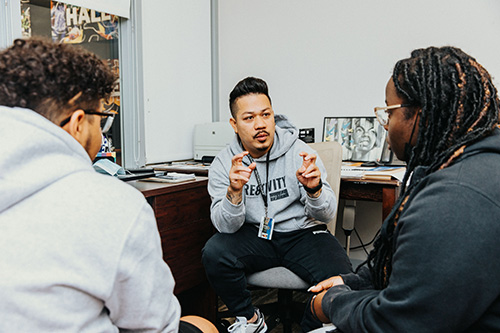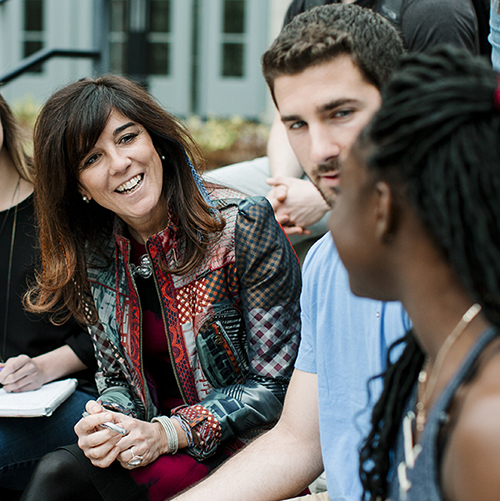Master’s In Urban Teaching
The Providence College Master of Education (M.Ed.) in Urban Teaching program – the first of its kind in Rhode Island – aims to reduce the achievement gap in urban schools by providing early-career teachers the skills needed for success in urban classrooms. The program focuses on understanding the sociocultural contexts of urban teaching and developing strategies for student success.
Our Unique Approach
The Urban Teaching Program is committed to advance an asset-based orientation to urban education and a strengths-based approach in teaching that support cultural and linguistic diversity and ensure equitable learning opportunities. Candidates build knowledge of the dimensions of interculturality and culturally responsive pedagogies and understand that all students’ cultural identity should be recognized, respected, and accommodated.
What You’ll Study
The program consists of 10 courses and can be completed in one to five years. Seminars in the program offer ample opportunities for engaging in experiential learning, reflective teaching, and discussions on how to build on the strengths of diverse learners. The program also supports participants in developing engaged research with real-world implications and in acquiring awareness of the importance of community, school and home partnerships through civic engagement and participatory education projects.
Graduate Education Virtual Info Sessions
Required Cohort Courses
Summer (first year)
- EDU 661 Culturally Competent Teaching
- EDU 662 Differentiating Instruction for Diverse Urban Learners
Fall
- EDU 663 Diversity Seminar: Trauma-Informed Education
Spring
- EDU 665 English Applied Linguistics & Second Language Acquisition
Summer (second year)
- EDU 664 Engaged Research
English to Speakers of Other Languages (ESOL) Focus Area
As an alternative to individualized coursework students may choose to concentrate in ESOL. This focus area consists of the following 4 classes that complement the required EDU 665 English Applied Linguistics and Second Language Acquisition seminar:
- EDU 600 Assessment for English Language Learners
- EDU 667 English Language Teaching Methods
- EDU 669 English Teaching Practicum
- EDU 710 Foundations of Bilingual Education
Please note that this concentration does not lead to state certification as an ESOL instructor. Instead, it provides targeted support for teachers who will be working with Multilingual Learners.
Faculty

Our faculty are social-justice educators unwaveringly conscious of the changes in cultural ecologies and how they impact education. We question the legitimacy of mainstream literacy education practices that nurture conformism with the status quo and perpetuate the class divide. We believe in respecting the unique identity of each and every learner, and in reevaluating our own cultural backgrounds to learn openly from those with alternative narratives of difference and belonging. We are committed to promote shared responsibility between learners and teachers and foster a learning environment that supports diversity and equality. We believe in the value of university and community members working collectively and creatively toward the betterment of society, crafting a shared vision for change that will support every urban learner to overcome the barriers to full citizenship.
Comfort Ateh, Associate Provost for Diversity, Equity and Inclusion, Providence College.
Daniel Bryan, Director, Pachaysana Institute, Quito, Ecuador.
Sarah Campbell, Education Coordinator, Smith Hill Early Childhood Learning Center, Providence, RI.
Katie Cardamone, Co-founder and Director, Nuestro Mundo Bilingual School, Providence, RI.
Nuria Alonso García, Director, Urban Teaching & Director, Global Education & TESOL, Providence College.
Theresa Moore, Founder & President, T-Time Productions, Providence, RI.
Anjel Newmann, Co-executive Director, AS220, Providence, RI.
Sokeo Ros, Director for the Center Moore Hall & Director of the Smith Hill Annex, Providence College.
Program Objectives
- Students develop an asset-based orientation to urban education and a strengths-based approach in teaching that support cultural and linguistic diversity and ensure equitable learning opportunities.
- Students build knowledge of the dimensions of interculturality and culturally responsive pedagogies, and understand that all students’ cultural identity should be recognized, respected, and accommodated.
- Students build knowledge of language learning/teaching approaches and the structure of the English language through applied phonetics, morphology and semantics applicable to ESOL contexts in the US.
- Students utilize content, knowledge and skills to develop engaged research with real-world implications: case studies, teaching modules and a thesis project examining education in urban contexts.
Urban Teaching with Teacher Certification
Interested in becoming a high school teacher? Looking for a program that sets you on a path for teacher certification and a master’s degree?
Consider our combined Teacher Certification Program [TCP] and Master of Education in Urban Teaching [M.Ed.]. This one-of-a-kind program is offered by the Providence College School of Continuing Education and the Graduate Studies Program. It provides an alternative path to secondary school certification and focuses on training teachers to succeed in diverse, urban classrooms. In other words, it’s real preparation for real classrooms — those with the most need.

About the Director
Nuria Alonso García is a civically engaged educator and strives to develop through her scholarship a more profound understanding and praxis of how language, identity, and cultural constructs intersect, how culturally sustaining pedagogies promote inclusivity in learning, and how civic engagement and experiential learning foster reciprocal partnerships. Nuria has led community engagement projects in Argentina, Ecuador, Mexico, and Nicaragua and collaborated with linguists and aspiring teachers in Russia during her Fulbright appointment at the Saint Petersburg State Polytechnical University Institute of Humanities. In 2021, she was invited as Visiting Researcher at Université du Québec à Montréal, École des langues and joined a newly established research group on Language, Culture, Identity and Community (CLIC) where she leads initiatives pertaining to her engaged scholarship on critical language pedagogy and intercultural learning in collaboration with faculty and students in the English department.
Contact Us
Dr. Nuria Alonso Garcia
Program Director
Feinstein Hall 315
401.865.2048
nalonsog@providence.edu






